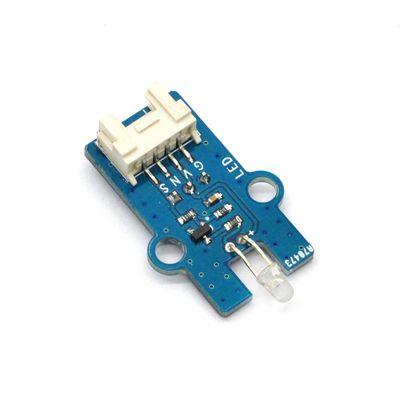Difference between revisions of "Lighting Emitting Diode (LED)"
(→Download) |
(→Overview) |
||
| Line 6: | Line 6: | ||
LED electronic brick can be connected to digital I/O port and used as indicator of power or signal. When input is low level, LED lamp will be OFF; when the input is high level, LED lamp will be ON. When connected to an analog pulse width modulation (PWM) output, it can be made into a breath lamp. | LED electronic brick can be connected to digital I/O port and used as indicator of power or signal. When input is low level, LED lamp will be OFF; when the input is high level, LED lamp will be ON. When connected to an analog pulse width modulation (PWM) output, it can be made into a breath lamp. | ||
| + | |||
| + | Go shopping [http://imall.iteadstudio.com/im130418002.html Lighting Emitting Diode (LED) (IM130418002)] | ||
==Features== | ==Features== | ||
Latest revision as of 06:49, 11 June 2014
Contents
Overview
What is an electronic brick? An electronic brick is an electronic module which can be assembled like Lego bricks simply by plugging in and pulling out. Compared to traditional universal boards and circuit modules assembled with various electronic components, electronic brick has standardized interfaces, plug and play, simplifying construction of prototype circuit on one’s own. There are many types of electronic bricks, and we provide more than twenty types with different functions including buttons, sensors, Bluetooth modules, etc, whose functions cover from sensor to motor drive, from Ethernet to wireless communication via Bluetooth, and so on. We will continue to add more types to meet the various needs of different projects.
LED electronic brick can be connected to digital I/O port and used as indicator of power or signal. When input is low level, LED lamp will be OFF; when the input is high level, LED lamp will be ON. When connected to an analog pulse width modulation (PWM) output, it can be made into a breath lamp.
Go shopping Lighting Emitting Diode (LED) (IM130418002)
Features
1. Plug and play, easy to use. Compatible with the mainstream 2.54 interfaces and 4-Pin Grove interfaces in the market.

2. With use of M4 standard fixed holes, compatible with M4-standard kits such as Lego and Makeblock.

3. With isolation circuit to prevent from damages to LED by external circuit and with stronger drive capability.

4. Rotatable detecting direction for better adaption.

Specifications
| PCB size | 33.0mm X 14.0mm X 1.6mm |
| Working voltage | 3.3 or 5V DC |
| Operating voltage | 3.3 or 5V DC |
| Compatible interfaces | 2.54 3-pin interface and 4-pin Grove interface(1) |
Note 1: S for analog output port, V and G for voltage at the common collector and ground respectively
Electrical Characteristics
| Parameter | Min. | Typical | Max. | Unit |
| Working voltage | 3 | 5 | 5.5 | VDC |
| Digital input high level VinH(VCC=5V) | 0.7 | 5 | 5 | V |
| Digital input low level VinL(VCC=5V) | 0 | 0 | 0.6 | V |
| Working current(VCC=5V,S=HIGH) | - | 2.5 | - | mA |
Demo
Connect S port of LED electronic brick to D13 port of Arduino board, and we will use the following program to make LED lamp flash at intervals of 1s.
int LED= 13;
void setup() {
// initialize the digital pin as an output.
pinMode(LED, OUTPUT);
}
void loop() {
digitalWrite(LED, HIGH); // turn the LED off (HIGH is the voltage level)
delay(1000); // wait for a second
digitalWrite(LED, LOW); // turn the LED off by making the voltage LOW
delay(1000); // wait for a second
}
 Notice
Notice